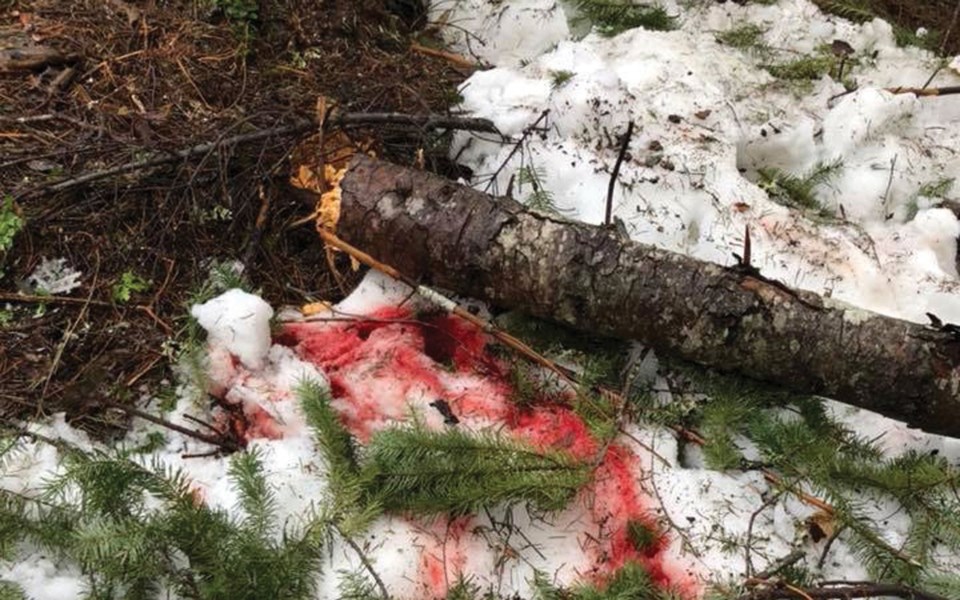Whistler has lost its first bear of the season.
Last week, conservation officers killed a black bear that had been slated for destruction after injuring a woman earlier this month.
The Whistler RCMP responded to a report of a bear eating compost in the Alpine area on the morning of Friday, April 6. Police managed to locate the bear in the backyard of a residence on Alpine Way, where it "immediately charged" an officer "without warning," according to police. The officer then fired several bear bangers to add some distance between himself and the animal. A conservation officer later arrived on the scene, shooting and killing the bear.
Although conservation officers did issue a $230 fine to an individual in Alpine for failing to secure their garbage, Sgt. Simon Gravel with the Conservation Officer Service (COS) said that, due to the animal's level of food conditioning and aggressive behaviour, it was already slated for destruction prior to accessing the compost.
The bear was ear-tagged, indicating a previous history of conflict. Gravel confirmed it was the same bear that had been spotted in recent days accessing non-natural food in the Bayshores and Nordic areas and had swatted a woman's leg on the evening of April 1, causing minor injuries.
Believed to be between 15 and 20 years old, Gravel said the male bear had managed to avoid conflict with humans for much of its life. It was last captured in 2016 and relocated from Whistler Village, "a no-go zone for black bears," Gravel noted.
"For the most part, he had managed to stay away from conflict, but for some reason, this year he was very early out of the den seeking some non-natural food, which definitely led to some concerning behaviour."
Last week, authorities warned of a second, smaller black bear that had accessed non-natural food and was reported charging a dog in the White Gold area. Gravel, who has not personally witnessed the bear, is now not so sure it's different from the adult male bear that was killed last week.
"Because it's so early in the season, it just makes me question if we're talking about the same bear here," Gravel said, noting how bears will naturally be smaller at this time of year after a winter of hibernation. "It is possible that there is also a smaller bear that's been seeking food, but I can't confirm that at this point."
Nonetheless, with more bears expected to emerge from hibernation in the coming weeks, the message around proper bear practices is a timely one.
"Bear activity is usually heightened at this time of year as bears come out of hibernation. If there are less food sources, that means (bears) will probably be moving into public areas more, so people need to be vigilant," urged Nicole Fitzgerald, spokesperson for the Whistler Get Bear Smart Society. Fitzgerald also reminded that vehicles are not the place to store food. "We had a number of vehicle break-ins last year, so we need to stress to the public that this means even groceries," she added. "Groceries are huge attractants. A sealed granola bar in the glove compartment is a huge attractant. A used coffee cup in the back of a car is an attractant. People should be aware of what's in their vehicle."
Ranya Dube with the citizen-led Whistler Wildlife Protection Group (WWPG), stressed the importance of calling the COS early enough so officers can intervene before having to resort to lethal measures. Many in the community have expressed reluctance in calling the COS over fear that it will inevitably lead to a bear being killed.
"This perception of the COS has got to stop. It's our fault," she said.
Dube added that the WWPG, which was formed in 2016 following a wave of public outcry over the deaths of a 10-year-old sow and her two cubs near Lost Lake, has struggled to attract volunteers, despite the level of "outrage" many in the community are feeling. "It's really good that everyone is outraged, but we need to act as a community," she said.
The WWPG will be pushing the municipality to raise its fines for failing to secure wildlife attractants in an upcoming letter to council, Dube said. Failure to comply with Whistler's garbage disposal and wildlife attractant bylaw currently results in a fine of $200 per day.
The Conservation Officer Service's RAPP line is 1-877-952-7277. Bylaw violations in the event of attractants being left unsecured can be reported to the municipality at 604-935-8280 during business hours.




